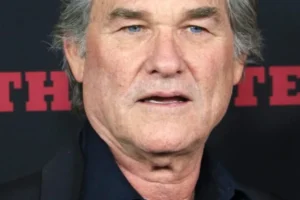The fluorescent lights hummed overhead in the sterile corridors of St. Mary’s General Hospital, casting their harsh, unforgiving glow on everything below. It was the kind of lighting that made even the healthiest person look pallid and worn, and for 78-year-old Margaret Chen, it only emphasized her vulnerability as she sat hunched in her wheelchair near the busy nurses’ station.
Margaret had been waiting for what felt like hours, though the clock on the wall indicated it had only been forty-five minutes. Time moved differently when you were in pain, when every breath was a conscious effort, and when the world around you seemed to blur into a cacophony of indifferent voices and hurried footsteps.
She had come to the hospital that morning with her daughter Linda, who had reluctantly taken time off work to drive her mother to what was supposed to be a routine follow-up appointment. But routine had quickly become complicated when Margaret’s blood pressure readings came back alarmingly high, and the doctor had ordered additional tests that required her to wait in the general ward area.
Linda had stepped out to make some urgent work calls—her boss had been less than understanding about the sudden absence—leaving Margaret alone with instructions to “just wait here until they call your name.” The problem was, Margaret’s hearing wasn’t what it used to be, and her English, though functional, became uncertain when she was stressed or unwell.
As the minutes ticked by, Margaret’s discomfort grew. She needed to use the restroom, but every time she tried to get someone’s attention, the staff members seemed to look right through her. She raised her hand tentatively, the way she used to do in school decades ago, but nurses rushed past with clipboards and medical equipment, their eyes focused on their destinations rather than on an elderly woman who seemed to blend into the institutional furniture.
“Excuse me,” she called out softly, her voice barely audible above the general din of the hospital. A young nurse in bright purple scrubs paused for a moment, glanced in Margaret’s direction, but then her phone buzzed with what appeared to be an urgent message, and she hurried away without acknowledging Margaret’s presence.
Margaret felt her cheeks burn with embarrassment. She tried again, this time a little louder, “Please, I need—” but her words were cut off as a team of medical personnel rushed past, wheeling another elderly patient toward the emergency wing. The commotion left her feeling even smaller and more invisible than before.
The need to use the restroom was becoming urgent now, and Margaret attempted to stand from her wheelchair. Her legs, weakened by a recent bout of pneumonia and unsteady from the blood pressure medication, trembled beneath her. She gripped the armrests tightly, trying to summon the strength to stand, when disaster struck.
As she rose, her purse, which had been precariously balanced on her lap, tumbled to the floor. The contents scattered across the polished linoleum: her wallet, prescription bottles, reading glasses, a small packet of tissues, and most embarrassingly, her adult incontinence pads. The pads, which she had carefully hidden in a discrete pouch, were now visible for anyone to see.
Margaret felt her world collapse in that moment. The physical discomfort was nothing compared to the crushing weight of humiliation that settled over her like a heavy blanket. She looked around desperately, hoping no one had noticed, but she could see a group of younger visitors near the vending machines pointing and whispering. A teenage boy actually laughed, quickly shushing himself when his mother shot him a stern look.
Tears welled up in Margaret’s eyes as she slowly lowered herself back into the wheelchair. Her arthritic hands shook as she contemplated how she might retrieve her scattered belongings without falling or drawing more attention to herself. This was her nightmare realized—being seen as a burden, as someone whose basic human dignity had been stripped away by age and infirmity.
“Ma’am, are you alright?”
The voice was deep, gravelly, and spoke with the kind of authority that cut through the hospital noise like a knife through silk. Margaret looked up through her tears to see a man in his seventies standing beside her wheelchair. He was tall and lean, with silver hair and weathered features that spoke of a life fully lived. He wore a simple leather jacket over a button-down shirt, and his presence seemed to command immediate respect from everyone in the vicinity.
This was Robert “Duke” Morrison, though most people knew him simply as Duke. He was a retired film industry professional who had worked behind the cameras for decades, building a reputation as someone who got things done with quiet efficiency and unwavering integrity. He had come to the hospital that day to visit his longtime friend and former colleague, James “Jimmy” Stewart Jr., who was recovering from hip surgery.
Duke had been walking toward the elevator when he noticed the commotion around Margaret’s wheelchair. Unlike the others who had glanced and moved on, he had stopped and truly seen what was happening. He recognized the look in her eyes—the same expression he had seen on his own mother’s face during her final years, when the world seemed determined to rob her of her dignity at every turn.
Without hesitation, Duke knelt down beside Margaret’s wheelchair, his movements deliberate and respectful. “Let me help you with this,” he said quietly, beginning to gather her scattered belongings with the same care he might show handling precious artifacts.
Margaret watched in amazement as this stranger—this gentle giant of a man—carefully collected each item, including the incontinence pads, which he placed discretely back in her purse without a trace of judgment or embarrassment. His weathered hands moved with surprising gentleness as he retrieved her reading glasses, checking them for damage before carefully cleaning the lenses with a handkerchief from his own pocket.
“These are good glasses,” he said conversationally, as if they were old friends discussing the weather. “My late wife had a pair just like them. She always said they were the only ones that didn’t give her headaches.”
As he spoke, Duke’s presence seemed to create a protective bubble around Margaret. The whispers and stares from nearby people gradually ceased, replaced by a respectful silence. There was something about his calm authority that made others stop and reconsider their own behavior.
“What’s your name, ma’am?” Duke asked as he handed Margaret her purse, now neatly reorganized.
“Margaret,” she whispered, her voice still shaky with emotion. “Margaret Chen.”
“Well, Mrs. Chen, it’s a pleasure to meet you. I’m Duke Morrison.” He extended his hand for a gentle handshake, treating her with the same courtesy he might show a dignitary. “Now, what can I do to help make your day a little better?”
Margaret felt something she hadn’t experienced in months—genuine human connection. Here was someone who saw her not as a problem to be solved or an obstacle to be navigated around, but as a person deserving of respect and kindness.
“I… I need to use the restroom,” she admitted, her cheeks flushing with embarrassment. “But everyone is so busy, and I didn’t want to be a bother…”
Duke’s expression shifted to one of gentle understanding mixed with barely contained outrage at the situation. “Mrs. Chen, you are never a bother for needing basic human care. Let’s get this sorted out right now.”
What happened next would be talked about in the halls of St. Mary’s General Hospital for months to come. Duke Morrison, with his commanding presence and natural leadership abilities, transformed the entire atmosphere of the ward. He approached the nurses’ station with the kind of purposeful stride that suggested he was accustomed to solving problems and getting results.
“Excuse me,” he said to the nurse behind the desk, his voice carrying the authority of someone who expected to be heard. “Mrs. Chen here needs assistance getting to the restroom. She’s been waiting patiently for quite some time.”
The nurse, a harried woman in her forties named Sarah, looked up from her computer screen with an expression that started as mild annoyance but quickly shifted to attention when she met Duke’s steady gaze. There was something about his presence that commanded respect—not through intimidation, but through an unmistakable aura of integrity and purpose.
“Oh, of course,” Sarah said, immediately standing. “I’m so sorry for the delay. We’ve been incredibly busy today, but that’s no excuse.” She gathered her composure and approached Margaret with renewed focus. “Mrs. Chen, let me help you right away.”
But Duke wasn’t finished. As Sarah began to assist Margaret, he gently placed a hand on the nurse’s shoulder. “Sarah,” he said, reading her name tag, “I can see you’re all working incredibly hard here. But Mrs. Chen has been sitting there for almost an hour, and in that time, not one person stopped to check on her needs. That’s not the kind of care that reflects well on this hospital or on any of us as human beings.”
His words weren’t delivered as a lecture or a scolding, but as a simple statement of fact that carried far more weight than any angry outburst could have. Sarah felt the truth of his words settle over her, and she found herself seeing Margaret—truly seeing her—for the first time that day.
“You’re absolutely right,” Sarah said quietly. “Mrs. Chen, I apologize. We should have been taking better care of you.”
As Sarah carefully helped Margaret navigate to the restroom, Duke remained in the waiting area, but his influence continued to ripple outward. Other staff members who had overheard the exchange began to look around the ward with fresh eyes, noticing elderly patients and family members who might need assistance or simply a kind word.
When Margaret returned from the restroom, she found Duke exactly where she had left him, standing beside her wheelchair like a faithful guardian. But now there was a small crowd of people around him—not gawking or staring, but genuinely interested in helping.
A young medical student named David had brought Margaret a cup of water and a small packet of crackers. “In case you’re feeling lightheaded from the blood pressure medication,” he explained with a shy smile.
An elderly man named Harold, who was waiting for his own wife’s test results, had moved his chair closer to Margaret’s. “I hope you don’t mind the company,” he said. “Gets lonely waiting by yourself.”
Even the teenager who had laughed earlier approached hesitantly, his mother gently pushing him forward. “I’m sorry I laughed,” he said, his voice barely above a whisper. “That wasn’t cool of me.”
Margaret looked around in wonder at this small community that had formed around her. Just thirty minutes earlier, she had felt invisible and forgotten. Now she was surrounded by people who saw her as a person worthy of care and respect.
Duke watched this transformation with quiet satisfaction. He had learned long ago that kindness was contagious—that one person’s compassionate action could inspire others to examine their own behavior and choose to do better. He had seen it happen on movie sets, in his neighborhood, and now here in this hospital corridor.
“Mrs. Chen,” Duke said, settling into a nearby chair, “while we’re waiting for your daughter to return, would you like to tell me about yourself? I’m genuinely curious about your story.”
And so Margaret found herself sharing pieces of her life with this unexpected friend. She told him about growing up in Taiwan, about meeting her late husband in college, about raising three children while working as a seamstress, about the small apartment where she now lived alone, tending to a garden of herbs and vegetables on her tiny balcony.
Duke listened with the kind of attention that made Margaret feel valued and interesting. He asked thoughtful questions about her garden, about her grandchildren, about the traditional recipes she still cooked for family gatherings. In return, he shared stories of his own—tales from his years in the film industry, memories of his late wife, thoughts on the changes he had witnessed in the world over seven decades of living.
As they talked, something beautiful was happening around them. The area near Margaret’s wheelchair had become an informal gathering place where people stopped to check on her, to share a kind word, or simply to sit for a moment in the warm atmosphere that Duke’s initial act of kindness had created.
Dr. Patricia Williams, the attending physician who had ordered Margaret’s additional tests, noticed the change when she returned to check on her patient. She had been expecting to find an anxious elderly woman sitting alone, but instead she discovered Margaret at the center of a small, caring community.
“Mrs. Chen,” Dr. Williams said, approaching with Margaret’s test results, “I have good news. Your blood pressure has stabilized, and we were able to adjust your medication. You should be feeling much better in a few days.”
Margaret smiled, feeling lighter than she had in weeks. “Thank you, Doctor. I’m already feeling much better.”
Dr. Williams glanced around at the people gathered near Margaret’s wheelchair—Duke, Harold, the medical student David, nurse Sarah who had stopped by to check on her several times, and others who had been drawn into this circle of kindness.
“I can see that,” Dr. Williams said with a knowing smile. “Sometimes the best medicine isn’t something we can prescribe.”
When Linda finally returned from her phone calls, she was amazed at the scene that greeted her. Her mother, who had been anxious and withdrawn that morning, was now animated and smiling, surrounded by people who were clearly enjoying her company.
“Mom, what happened here?” Linda asked, not quite able to process the transformation.
“I made some new friends,” Margaret said simply, her eyes twinkling with joy. “Linda, I’d like you to meet Duke Morrison. He’s been taking very good care of me.”
Duke stood and extended his hand to Linda. “Your mother is a remarkable woman,” he said. “She’s been telling me about her victory garden and her famous dumplings. I think I may have to convince her to share that recipe.”
Linda looked between her mother and this distinguished stranger, trying to piece together what had transpired during her absence. Margaret, sensing her daughter’s confusion, began to explain—not the humiliating incident that had started it all, but the kindness that had followed. She spoke about Duke’s generosity, about the way the hospital staff had begun treating her with renewed respect, about the small community of friends that had gathered around her.
As Margaret recounted the story, Linda felt a complex mix of emotions. She was grateful to Duke for his kindness, but she was also struck by her own guilt. She had left her mother alone at a time when she was vulnerable, prioritizing work obligations over family care. She had been so focused on the inconvenience of the hospital visit that she had failed to consider her mother’s emotional needs.
“Mr. Morrison,” Linda said, her voice thick with emotion, “I can’t thank you enough for what you’ve done for my mother today.”
Duke waved away her gratitude with a gentle gesture. “Your mother didn’t need me to do anything special, Mrs…?”
“Linda. Linda Chen-Martinez.”
“Linda, your mother just needed what we all need—to be seen and treated with dignity. The kindness was already here in this hospital, in all these good people. Sometimes it just needs someone to remind everyone to pay attention.”
As the afternoon wound down and it became time for Margaret and Linda to head home, the small community that had formed around Margaret’s wheelchair began to disperse. But not before exchanging contact information, making plans for future visits, and ensuring that Margaret knew she had friends at St. Mary’s General.
Harold, the elderly man who had been waiting with his wife, made Margaret promise to bring some of her famous dumplings to the hospital’s monthly community dinner. “My wife would love to meet you,” he said. “She’s always looking for new recipes.”
Sarah, the nurse, made sure Margaret had her direct number at the hospital. “If you ever need anything when you come for your follow-up appointments, you ask for me specifically,” she said. “And I mean anything—even if you just want someone to talk to while you wait.”
David, the medical student, promised to check in on Margaret during her future visits. “I’d love to hear more about your herb garden,” he said. “I’m trying to grow some medicinal plants myself.”
But it was Duke’s farewell that touched Margaret most deeply. As Linda went to get the car, Duke knelt beside Margaret’s wheelchair one final time.
“Mrs. Chen,” he said, taking her hand in both of his, “I want you to remember something important. What happened here today—the way people responded with kindness and respect—that’s who people really are underneath all the hurry and stress. Sometimes we all just need a reminder to slow down and see each other clearly.”
Margaret squeezed his hand, tears of gratitude flowing freely now. “You gave me back my dignity today,” she said. “I will never forget that.”
Duke shook his head gently. “No, ma’am. Your dignity was never gone. It was always there. I just made sure other people could see it too.”
As Margaret was wheeled out to Linda’s car, she turned back to wave at Duke, who stood in the hospital entrance like a guardian angel in a leather jacket. She knew she would probably never see him again, but she also knew that his impact on her life would be permanent.
The drive home was quiet, both women lost in their own thoughts. Linda was processing the guilt and revelation of the day, while Margaret was marveling at how quickly her world had changed from one of isolation to one of connection.
“Mom,” Linda finally said as they pulled into Margaret’s apartment complex, “I’m sorry I left you alone today. I should have stayed with you.”
Margaret reached over and patted her daughter’s hand. “You have responsibilities, dear. I understand that. But today I learned something important—I don’t have to be invisible just because I’m old. There are still good people in the world who will see me if I’m brave enough to let myself be seen.”
In the weeks that followed, the story of what happened at St. Mary’s General Hospital continued to ripple outward. Sarah, the nurse, began implementing new protocols to ensure that elderly patients received regular check-ins during long waits. Dr. Williams started a volunteer program that paired medical students with elderly patients who needed companionship during extended hospital visits.
Harold and his wife became regular visitors to Margaret’s apartment, and Margaret became famous in her neighborhood for the community dinners she began hosting, serving those legendary dumplings that Duke had heard so much about.
The teenage boy who had initially laughed at Margaret’s predicament found himself volunteering at a local senior center, discovering that elderly people had fascinating stories and valuable wisdom to share.
And Duke Morrison continued being Duke Morrison—the kind of person who saw opportunities for kindness in everyday moments and had the courage to act on them. He never spoke publicly about what happened that day at the hospital, but those who knew him weren’t surprised by his actions. It was simply who he was—a man who understood that dignity and respect weren’t luxuries to be rationed, but basic human rights to be protected and defended.
Margaret’s story became a quiet legend at St. Mary’s General Hospital, passed down from one staff member to another as an example of how a single act of kindness could transform not just one person’s day, but an entire culture of care. New employees were told about the day when a distinguished visitor reminded everyone that behind every patient was a human being with a story worth hearing and a dignity worth preserving.
The most beautiful part of the story, perhaps, was that it didn’t end with Duke’s act of kindness, or even with the immediate response of those around Margaret. It continued every time Margaret shared her herbs with a neighbor, every time Linda made the choice to prioritize her mother’s emotional needs alongside her physical care, every time a hospital staff member took an extra moment to truly see an elderly patient.
Duke Morrison had started something that day—not through grand gestures or public declarations, but through the simple recognition that every person, regardless of age or circumstance, deserves to be treated with dignity and compassion. He had reminded everyone present that heroism isn’t about cape-wearing figures performing impossible feats, but about ordinary people choosing to do extraordinary things in ordinary moments.
And in a world that often feels divided and disconnected, that may be the most powerful reminder of all—that we all have the ability to be someone’s unexpected hero, to transform someone’s worst day into a memory of human kindness, and to prove that dignity and compassion are never out of style.
Margaret Chen kept Duke’s business card in her wallet until the day she died, five years later, surrounded by the large circle of friends she had built in the wake of that transformative day at the hospital. At her funeral, Linda shared the story of how a stranger’s kindness had given her mother not just a better day, but a renewed faith in the goodness of humanity.
Duke Morrison attended that funeral, sitting quietly in the back, listening as person after person shared stories of Margaret’s generosity and kindness in her final years. As he listened, he reflected on the beautiful truth that kindness, once released into the world, never really stops flowing. It just finds new channels, new hearts, new opportunities to make the world a little brighter.
And somewhere in the halls of St. Mary’s General Hospital, a young nurse named Sarah continues to carry forward the lesson she learned that day—that sometimes the most important medicine we can offer is simply the recognition that every person who walks through those doors is someone’s mother, father, spouse, or friend, deserving of care, respect, and human dignity.
The story of Margaret Chen and Duke Morrison reminds us that we all have the power to be the person who stops, who sees, who cares enough to act. In a world that often seems too busy for basic human kindness, they proved that taking time to treat each other with dignity isn’t just the right thing to do—it’s the thing that makes us most fully human.



